T
Holi is one of the most vibrant and joyful festivals in India. It is celebrated every year on the full moon day of the Hindu month of Phalguna, which usually falls in late February or early March. In 2023, Holi will be celebrated on March 8, with Chhoti Holi or Holika Dahan on March 7.
Holi is also known as the festival of colors, as people play with colored powders and water, splashing and spraying each other with fun and laughter. Holi is a celebration of life, love, and happiness. Time to forgive and forget, mend broken relationships, and express gratitude for all the blessings.
But do you know why Holi is celebrated? What are the stories and legends behind this colorful festival? What are the meanings and messages that Holi conveys? In this blog, we will explore the history and significance of Holi in India.
There are many stories and legends associated with Holi, but the most popular one is about Holika and Prahlad. Holika was a demoness who was the sister of King Hiranyakashipu, a tyrant who wanted everyone to worship him as God. Prahlad was his son who was a devotee of Lord Vishnu, the supreme deity in Hinduism. Hiranyakashipu hated his son’s devotion and tried to kill him many times, but failed. He then asked Holika to help him get rid of Prahlad. Holika had a boon that she could not be burned by fire, so she agreed to sit on a pyre with Prahlad on her lap. However, her boon was nullified by her evil intention, and she was burned to ashes while Prahlad emerged unharmed by chanting Lord Vishnu’s name. This story symbolizes the victory of good over evil and the power of faith.
Another story related to Holi is about Lord Krishna and Radha. Lord Krishna is an incarnation of Lord Vishnu who was born with a dark complexion due to a curse by a demon. He grew up in Vrindavan, where he fell in love with Radha, a fair-skinned girl. He was insecure about his appearance and wondered if Radha would love him back. His mother Yashoda advised him to apply some color to Radha’s face and make her look like him. He followed her advice and playfully smeared some color on Radha’s face, making her his own forever. Radha also reciprocated his love and accepted him as he was. This story symbolizes the divine love between Krishna and Radha and the celebration of diversity.
Holi is also marked as a harvest festival, commemorating spring’s arrival and the end of winter. It is a time when nature is filled with colors and beauty, inspiring people to rejoice in its glory. Holi also signifies new beginnings, as people shed their old clothes and wear new ones after playing with colors. It is an occasion when people let go of their grudges and negative energies, forgive their enemies, reconcile their differences, and start afresh with love and harmony.
Introduction: In today's digital age, businesses are continuously looking for ways to increase their online visibility, attract more traffic to their website, and ultimately, generate more leads and sales. One of the most effective ways to achieve these goals is through Pay-Per-Click (PPC) advertising. PPC advertising is an online marketing model in which advertisers pay a fee each time one of their ads is clicked. In this guide, we will discuss how to maximize results with PPC advertising.

Table of Contents:
- Setting Up a PPC Campaign
- Keyword Research
- Ad Creation
- Landing Pages
- Ad Monitoring and Optimization
- Budgeting

Setting Up a PPC Campaign:
The first step in maximizing results with PPC advertising is to set up a PPC campaign. This involves creating an account with a PPC advertising platform, such as Google Ads or Bing Ads. Once you have created an account, you can start creating your campaign. In order to get the most out of your campaign, you should ensure that you have a clear understanding of your target audience and your advertising goals.
Keyword Research:
Keyword research is a crucial aspect of PPC advertising. It involves identifying the keywords that your target audience is using to search for products or services similar to yours. This information is used to create targeted ads that appear when a user types in those specific keywords. By conducting thorough keyword research, you can ensure that your ads are seen by the right people at the right time.
Ad Creation:
The creation of your PPC ads is another critical component of maximizing results. Your ads should be compelling, relevant, and engaging to your target audience. You should also ensure that your ad copy is aligned with your landing pages to create a seamless user experience.
Landing Pages:
The landing page is where users are directed when they click on your ad. Your landing page should be designed to convert visitors into leads or customers. The page should be easy to navigate, visually appealing, and contain all the necessary information about your product or service.
Ad Monitoring and Optimization:
Once your ads are live, you should monitor their performance regularly. By doing so, you can identify which ads are performing well and which ones are not. You can then optimize your ads by making adjustments to your ad copy, landing pages, and targeting to improve their performance.
Budgeting:
Finally, you should consider your budget when maximizing results with PPC advertising. You should determine how much you are willing to spend on your campaign and ensure that you are getting a positive return on investment (ROI) for your ad spend.

Conclusion:
PPC advertising is an effective way to increase online visibility, attract more traffic to your website, and generate more leads and sales. By following the tips outlined in this guide, you can maximize your results and achieve your advertising goals. Remember to conduct thorough keyword research, create compelling ads and landing pages, monitor and optimize your ads regularly, and consider your budget when setting up your campaign.

Artificial intelligence (AI) has transitioned from a futuristic concept to a present-day reality, permeating various aspects of our daily lives. From smart home devices to personalized healthcare, AI's influence is growing exponentially, transforming how we interact with technology and each other. In this blog, we will explore the latest advancements in AI, its applications, and its impact on society.

In today's digital age, having a strong online presence is essential for businesses and individuals alike. One of the most effective ways to increase your online visibility is through search engine optimization or SEO for short. In this blog post, we will explore the basics of SEO and how it can help improve your online visibility.
What is SEO?
SEO is the practice of optimizing your website and its content to improve its visibility and ranking on search engine results pages (SERPs). The goal of SEO is to increase the quantity and quality of organic (unpaid) traffic to your website from search engines like Google, Bing, and Yahoo.
How does SEO work?
Search engines use complex algorithms to crawl and index websites and their content. When someone enters a search query into a search engine, the algorithm analyzes the keywords and phrases in the query and matches them with the content on relevant websites. The algorithm then ranks those websites based on various factors, including relevance, authority, and user experience.
SEO involves optimizing your website and its content to meet the criteria that search engines use to rank websites. This includes optimizing your website's technical structure, creating high-quality content that targets relevant keywords, and building high-quality backlinks to your website.
Why is SEO important?
SEO is essential for businesses and individuals looking to increase their online visibility and attract more organic traffic to their websites. Organic traffic is valuable because it is free, targeted, and has a higher conversion rate than other types of traffic, such as paid advertising.
By optimizing your website for SEO, you can improve your website's ranking on SERPs, making it more likely that potential customers will find your website when searching for relevant keywords. This, in turn, can lead to increased traffic, higher engagement, and ultimately, more conversions and sales.
Types of SEO:
There are two main types of SEO: on-page and off-page SEO.
On-page SEO involves optimizing your website's content and technical structure. This includes optimizing your website's title tags, meta descriptions, headers, images, and internal linking structure. On-page SEO also involves creating high-quality, keyword-rich content that targets your audience's search queries.
Off-page SEO, on the other hand, involves building high-quality backlinks to your website. Backlinks are links from other websites that point to your website. The more high-quality backlinks you have pointing to your website, the higher your website's authority and ranking on search engines.
Factors that affect SEO:
Several factors affect SEO, including:
1. Relevance: Search engines prioritize websites that are most relevant to a user's search query.
2. Authority: The authority of a website is determined by the quality and quantity of backlinks pointing to it.
3. User experience: Search engines prioritize websites that offer a good user experience, including fast loading times, easy navigation, and mobile-friendliness.
4. Content quality: High-quality, relevant, and engaging content is essential for ranking well on search engines.
5. Keywords: Using relevant keywords throughout your website's content and meta tags can help search engines understand what your website is about and rank it accordingly.
SEO Tools:
Several tools can help you with your SEO efforts, including keyword research tools, SEO audit tools, and backlink analysis tools. Keyword research tools help you identify relevant keywords and phrases to target with your content, while SEO audit tools can help you identify technical issues on your website that may be impacting your ranking. Backlink analysis tools can help you identify opportunities for building high-quality backlinks to your website.
SEO Trends:
SEO is constantly evolving, and it's important to stay up to date on the latest trends and best practices. Some of the current SEO trends include:
1. Focus on user intent: Search engines are increasingly prioritizing websites that meet the user's search intent. This means that your content should be tailored to the user's needs and interests.
2. Mobile optimization: With more people using their mobile devices to browse the internet, search engines are prioritizing mobile-friendly websites.
3. Voice search optimization: With the rise of voice assistants like Siri and Alexa, optimizing your content for voice search queries can help improve your ranking on search engines.
4. Local SEO: If you have a brick-and-mortar business, optimizing your website for local SEO can help you attract more local customers. This includes optimizing your website for local keywords and phrases and creating local listings on Google My Business.
Conclusion:
SEO is a complex and ever-changing field, but by understanding the basics and staying up to date on the latest trends and best practices, you can improve your online visibility and attract more organic traffic to your website. Remember to focus on creating high-quality, relevant content, optimizing your website's technical structure, and building high-quality backlinks to your website. With the right SEO strategy, you can achieve better online visibility, drive more traffic to your website, and ultimately grow your business.

In the world of digital marketing, Search Engine Optimization (SEO) has become an essential part of any business's online presence. SEO is a practice that involves optimizing your website to rank higher in search engine results pages (SERPs) for specific keywords and phrases. The higher your website ranks, the more traffic and potential customers you can attract.
SEO is not a one-time process. It requires continuous monitoring, tweaking, and improvement to keep your website ranking high in SERPs. Fortunately, there are several SEO tools available that can help you optimize your website and boost your ranking. In this blog, we will discuss the top SEO tools you can use to improve your website's visibility and increase your organic traffic.
Google Analytics is a web analytics service that allows you to track and analyze your website's traffic. It provides valuable insights into how users interact with your website, including the pages they visit, how long they stay on each page, and where they are located. With Google Analytics, you can also track your website's performance in terms of bounce rate, click-through rate (CTR), and conversion rate.
Google Analytics can help you identify areas of your website that need improvement. For example, if you notice a high bounce rate on a particular page, you can investigate why users are leaving the page quickly and make changes to improve the page's engagement. Additionally, Google Analytics can help you measure the effectiveness of your SEO efforts and adjust your strategy accordingly.
2. Ahrefs
Ahrefs is a comprehensive SEO tool that provides you with an in-depth analysis of your website's backlink profile, competitor analysis, keyword research, and more. With Ahrefs, you can track your website's backlinks, identify the sources of your backlinks, and analyze your competitors' backlink profiles. You can also use Ahrefs to find new keywords and phrases to target and monitor your website's rankings for specific keywords.
Ahrefs can help you identify opportunities for link building, optimize your website's content for specific keywords, and monitor your website's performance over time. The tool also offers a range of reports and dashboards that make it easy to visualize your website's performance and identify areas that need improvement.
3.SEMrush
SEMrush is a popular SEO tool that provides a range of features to help you optimize your website for search engines. With SEMrush, you can conduct keyword research, track your website's ranking for specific keywords, and analyze your competitors' websites. The tool also offers on-page SEO analysis, backlink analysis, and a range of other features to help you improve your website's performance.
One of the unique features of SEMrush is its ability to perform site audits. The tool can scan your website for technical issues, such as broken links, duplicate content, and crawl errors. It can also provide recommendations for improving your website's performance and fixing any issues that may be impacting your ranking.
4. Moz Pro
Moz Pro is an all-in-one SEO tool that provides a range of features to help you optimize your website for search engines. With Moz Pro, you can conduct keyword research, track your website's ranking for specific keywords, and analyze your competitors' websites. The tool also offers on-page SEO analysis, backlink analysis, and site auditing features.
One of the unique features of Moz Pro is its Page Optimization feature. This feature analyzes your website's pages and provides recommendations for improving on-page SEO elements, such as title tags, meta descriptions, and content optimization. The tool also offers a range of reports and dashboards to help you visualize your website's performance and identify areas that need improvement.
5. Google Search Console
Google Search Console is a free SEO tool provided by Google that allows you to monitor and optimize your website
Conclusion
SEO is a complex and ongoing process that requires continuous monitoring, tweaking, and improvement. Fortunately, there are several SEO tools available that can help you optimize your website and boost your ranking in search engine results pages. By using these tools to analyze your website's performance, identify areas for improvement, and make data-driven decisions, you can increase your organic traffic and attract more potential customers to your website.

Today the India - Maldives partnership is becoming a source of peace , stability, & prosperity for the region.
- PM Modi at a Joint Press Meet with President Ibrahim Mohamed Solih of Maldives
- India and the Maldives share a deep and abiding friendship
- Close coordination in the field of defense and security is vital for the peace and stability of the region
- We have decided to provide an additional $100 million line of credit to ensure all projects are completed on time
- We reviewed plans for the construction of 4.000 social housing units in Greater Male

Weight loss is a common goal for many individuals, especially those who are looking to improve their overall health and fitness levels. While there are many methods for achieving weight loss, a combination of regular exercise and a healthy diet is widely considered to be the most effective approach. In this blog post, we will discuss the ultimate gym diet plan that can help you achieve rapid weight loss.

Step 1: Calculate Your Daily Calorie Requirements
The first step in creating an effective gym diet plan is to calculate your daily calorie requirements. This will help you determine the number of calories you need to consume each day to lose weight. There are several online calculators that can help you determine your daily calorie requirements based on your age, gender, height, weight, and activity level.
Step 2: Choose Your Macronutrient Ratio
Once you have calculated your daily calorie requirements, the next step is to choose your macronutrient ratio. Macronutrients are the three main nutrients that your body needs in large quantities: protein, carbohydrates, and fats. The ideal macronutrient ratio for weight loss is a matter of debate, but a general guideline is to consume 40% of your calories from carbohydrates, 30% from protein, and 30% from fats.
Step 3: Plan Your Meals
Now that you have determined your daily calorie requirements and macronutrient ratio, the next step is to plan your meals. A well-planned gym diet plan should include a variety of foods from all food groups, including fruits, vegetables, whole grains, lean proteins, and healthy fats. Here's an example of a one-day meal plan that follows the macronutrient ratio mentioned above:
Breakfast: Egg white omelet with spinach and mushrooms, whole wheat toast, and a small fruit salad.
Snack: Greek yogurt with berries and almonds.
Lunch: Grilled chicken breast with mixed vegetables and quinoa.
Snack: Apple slices with almond butter.
Dinner: Grilled salmon with roasted sweet potatoes and green beans.
Step 4: Choose Your Supplements
Supplements can be a useful addition to your gym diet plan, especially if you are struggling to meet your daily macronutrient requirements. However, it's important to choose supplements that are safe and effective. Here are some supplements that can help you achieve your weight loss goals:
- Protein powder: Protein powder can help you meet your daily protein requirements, especially if you are vegetarian or vegan.
- Multivitamin: A good quality multivitamin can help ensure that your body is getting all the essential vitamins and minerals it needs.
- Omega-3 fatty acids: Omega-3 fatty acids can help reduce inflammation in the body and promote weight loss.
Step 5: Stay Hydrated
Staying hydrated is essential for weight loss and overall health. Drinking plenty of water throughout the day can help you feel full and reduce cravings. Aim to drink at least eight glasses of water per day, and avoid sugary drinks and alcohol.
Step 6: Be Consistent and Patient
Achieving rapid weight loss requires consistency and patience. It's important to stick to your gym diet plan and exercise routine consistently over time to see results. Remember that weight loss is a gradual process, and it may take several weeks or even months to achieve your desired results.

Read More: 7-Day Gym Diet: The Ultimate Plan | Small Habits, Big Changes: Atomic Habits in Action
Conclusion:
In conclusion, the ultimate gym diet plan can help you achieve rapid weight loss when combined with regular exercise and a healthy lifestyle. By calculating your daily calorie requirements, choosing your macronutrient ratio, planning your meals, choosing your supplements, staying hydrated, and being consistent and patient, you can achieve your weight loss goals and improve your overall health and fitness levels.

Starting a business in your hometown can be a rewarding and lucrative endeavor. You have the advantage of local knowledge, a built-in support network, and a deep understanding of the community's needs. However, choosing the right business idea is crucial for success. In this blog, we will explore the top 10 businesses to start in your hometown that have the potential to bring in profits. From service-based ventures to innovative retail concepts, we will provide you with a diverse range of ideas that align with the unique characteristics and demands of your local community. So, whether you're an aspiring entrepreneur or considering a career change, read on to discover the most promising business opportunities in your hometown.

Local Food and Beverage Establishments
Food and beverage businesses have long been successful in hometown settings. Consider opening a local cafe, restaurant, or bakery that offers unique culinary experiences or specializes in local flavors. Focus on quality ingredients, personalized service, and creating a cozy atmosphere that resonates with the community.
Artisanal and Handcrafted Products
Tap into the growing demand for unique, locally made products. Start a business that specializes in artisanal crafts, handmade jewelry, pottery, or other artistic creations. Highlight the craftsmanship and local talent to attract both residents and tourists looking for one-of-a-kind items.
Fitness and Wellness Studios
With the rising focus on health and wellness, opening a fitness or wellness studio can be a lucrative venture. Consider offering yoga, pilates, dance, or specialized fitness classes. Provide a welcoming and inclusive environment that promotes physical and mental well-being.
Eco-Friendly and Sustainable Businesses
Cater to the increasing demand for eco-friendly and sustainable products and services. Start a business that focuses on recycling, upcycling, zero-waste practices, or sustainable fashion. Promote conscious consumerism and environmental stewardship.
Personalized Services
Offer personalized services that cater to the specific needs of your community. This could include pet grooming, home organizing, tutoring, event planning, or personal shopping. Focus on delivering exceptional service and building long-term relationships with clients.
Technology and Digital Solutions
Incorporate technology into your hometown business by offering digital solutions. This could involve providing website design, social media management, online marketing, or IT consulting services. Help local businesses navigate the digital landscape and enhance their online presence.
Specialty Retail Stores
Identify niche markets within your community and open a specialty retail store. This could involve selling organic products, gourmet foods, niche fashion items, or unique home decor. Offer a curated selection that meets the specific tastes and preferences of your hometown.
Mobile Food Truck or Pop-up Shop
If your hometown lacks a variety of food options or retail experiences, consider starting a mobile food truck or a pop-up shop. This allows you to bring your products or services directly to the community, whether it's serving gourmet street food or offering unique merchandise. You can participate in local events, parks, or busy areas to maximize exposure and attract customers. Flexibility and creativity are key in operating a mobile business, and it allows you to cater to different locations and target different customer segments.
Co-working Space
With the rise of remote work and entrepreneurship, opening a co-working space in your hometown can be a profitable venture. Create a professional and collaborative environment where freelancers, startups, and remote workers can rent workspace and access shared amenities. Offer flexible membership options, organize networking events, and provide additional services like meeting room rentals or business support. By fostering a sense of community and providing a productive workspace, you can attract professionals from various industries.
Health and Wellness Retreats
If your hometown has natural beauty or a tranquil environment, consider creating health and wellness retreats. Offer relaxation, yoga, meditation, and rejuvenation programs for individuals or groups seeking a break from their daily routines. Provide a peaceful haven for self-care and rejuvenation.
Conclusion
Starting a successful business in your hometown requires careful consideration of local needs and market demands. The top 10 business ideas discussed in this blog provide a starting point for exploring lucrative opportunities that align with the unique characteristics of your community. Remember to conduct thorough market research, develop a solid business plan, and establish strong connections within the community. Success in your hometown business relies on providing quality products or services, fostering customer loyalty, and adapting to changing trends and preferences

In a move that is sure to heat up the social media wars, Instagram's Threads app attracted over 50 million users in a single day. The app, which is designed as a more private and intimate alternative to Twitter, was launched on Thursday and quickly became a hit with users.

Thread is a text-based app that allows users to share photos, videos, and text with their close friends. The app is integrated with Instagram, so users can easily share their Threads posts to their main Instagram feed. However, Threads is also designed to be more private than Instagram, with features like end-to-end encryption and the ability to control who can see your posts.
The success of Threads is a major coup for Instagram, which has been looking for ways to challenge Twitter's dominance in the micro-blogging space. Twitter has been struggling in recent years, as users have flocked to other platforms like Instagram and TikTok. Threads could help Instagram to win back some of those users, and it could also attract new users who are looking for a more private and intimate social media experience.
The launch of Threads is also a sign of the intensifying rivalry between Instagram and Twitter. Both platforms are constantly trying to innovate and attract new users, and Threads is just the latest example of that. It will be interesting to see how Twitter responds to Threads, and whether it can launch a successful counter-measure.
In the meantime, Threads is off to a strong start. The app has already been downloaded over 100 million times, and it is showing no signs of slowing down. It remains to be seen whether Threads can become a major player in the social media space, but it is certainly off to a promising start.
Here are some of the factors that contributed to Threads' success:
- The app's focus is on privacy. Threads are designed to be a more private and intimate social media experience than Twitter. This is a major selling point for users who are concerned about their privacy.
- The app's integration with Instagram. Threads are integrated with Instagram, so users can easily share their Threads posts to their main Instagram feed. This makes it easy for users to connect with their friends and followers on both platforms.
- The app's timing. Threads was launched at a time when Twitter is struggling. This gave Threads a major advantage, as users were looking for a new and improved social media experience.
Here are some of the challenges that Threads face:
- The competition from Twitter. Twitter is the dominant player in the micro-blogging space, and it will be difficult for Threads to compete with it.
- The app's limited features. Threads is a relatively simple app, and it lacks some of the features that users expect from a social media platform. For example, Threads does not have a direct messaging feature.
- The app's lack of brand recognition. Thread is a new app, and it does not have the same brand recognition as Twitter. This could make it difficult for Threads to attract new users.
Overall, Threads is a promising app with a lot of potential. The app has already been successful, and it could become a major player in the social media space. However, Threads faces some challenges, and it will be interesting to see how the app performs in the long term.


- In this blog, we will explore the benefits of quitting smoking and why No Smoking Day is such an important event. We will also offer some tips for people who want to quit smoking and some resources that can help them along the way.The Benefits of Quitting Smoking:
- Improved Health: The most obvious benefit of quitting smoking is improved health. Smoking damages almost every organ in the body and is a leading cause of heart disease, stroke, lung cancer, and many other illnesses. Quitting smoking can significantly reduce the risk of these diseases and improve overall health.
- Better Quality of Life: Smoking can have a significant impact on a person's quality of life. Smokers may experience shortness of breath, coughing, and decreased physical fitness. Quitting smoking can improve lung function and increase energy levels, making it easier to enjoy physical activities.
- Improved Mental Health: Smoking can also have a negative impact on mental health. Smokers are more likely to experience anxiety, depression, and other mental health problems. Quitting smoking can help improve mental health and reduce the risk of these problems.
- Save Money: Smoking is an expensive habit. Quitting smoking can save a person a significant amount of money over time. According to the American Cancer Society, a pack-a-day smoker can save over $2,000 a year by quitting smoking.

- Set a quit date: Choose a date to quit smoking and stick to it.
- Find support: Quitting smoking can be challenging, but it's easier with support. Tell family and friends that you're quitting smoking and ask for their support.
- Avoid triggers: Identify situations that may trigger the urge to smoke, such as stress or social events. Try to avoid these triggers or find ways to cope with them without smoking.
- Use Nicotine Replacement Therapy: Nicotine replacement therapy (NRT) can help reduce cravings and withdrawal symptoms. NRT products include nicotine gum, patches, lozenges, inhalers, and nasal sprays.
- Get Help: There are many resources available to help people quit smoking, such as quitlines, support groups, and online resources.

In today's competitive business world, having a strong entrepreneurial mindset is crucial to achieving success. It requires the ability to think creatively, take calculated risks, and adapt to change quickly. However, mastering these skills is easier said than done. In this blog post, we will discuss how to develop an entrepreneurial mindset and crush business goals by following some essential tips and practices.
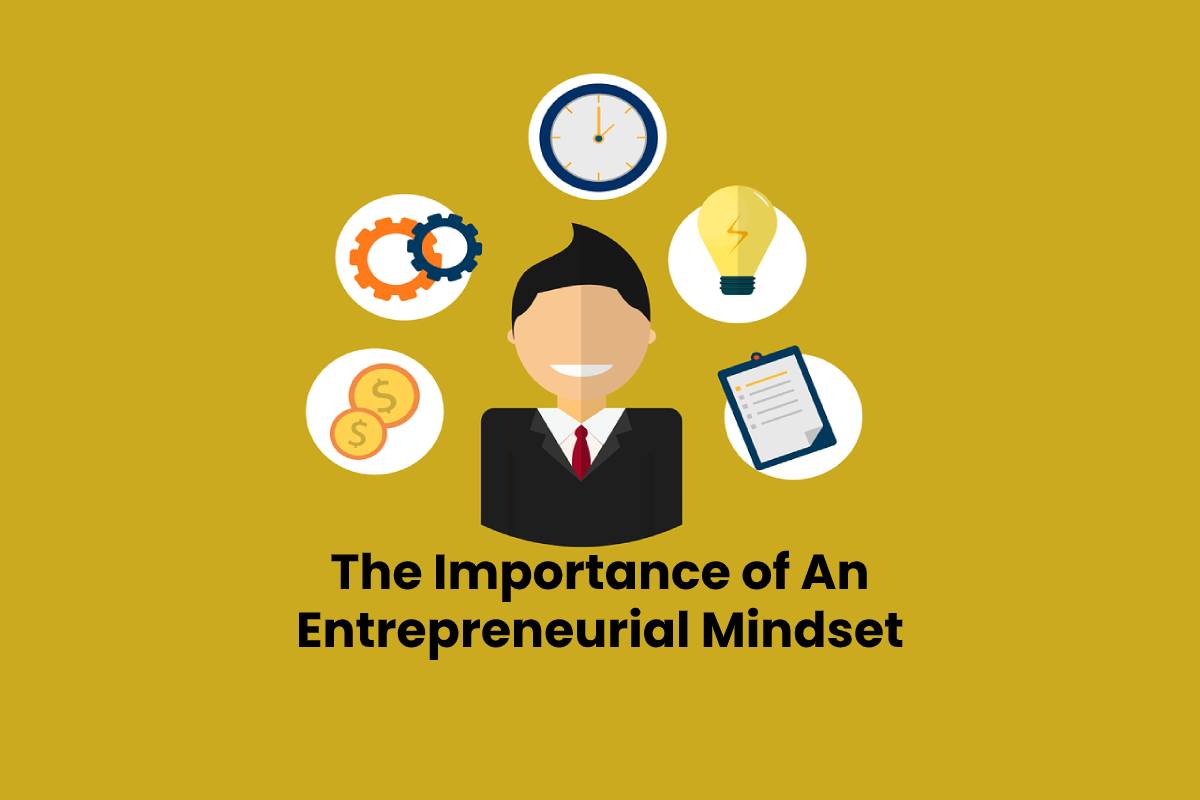
Table of Contents:
- Understanding the Entrepreneurial Mindset
- Setting Clear and Attainable Goals
- Developing a Growth Mindset
- Embracing Risk and Failure
- Creating a Supportive Network
- Staying Focused and Committed
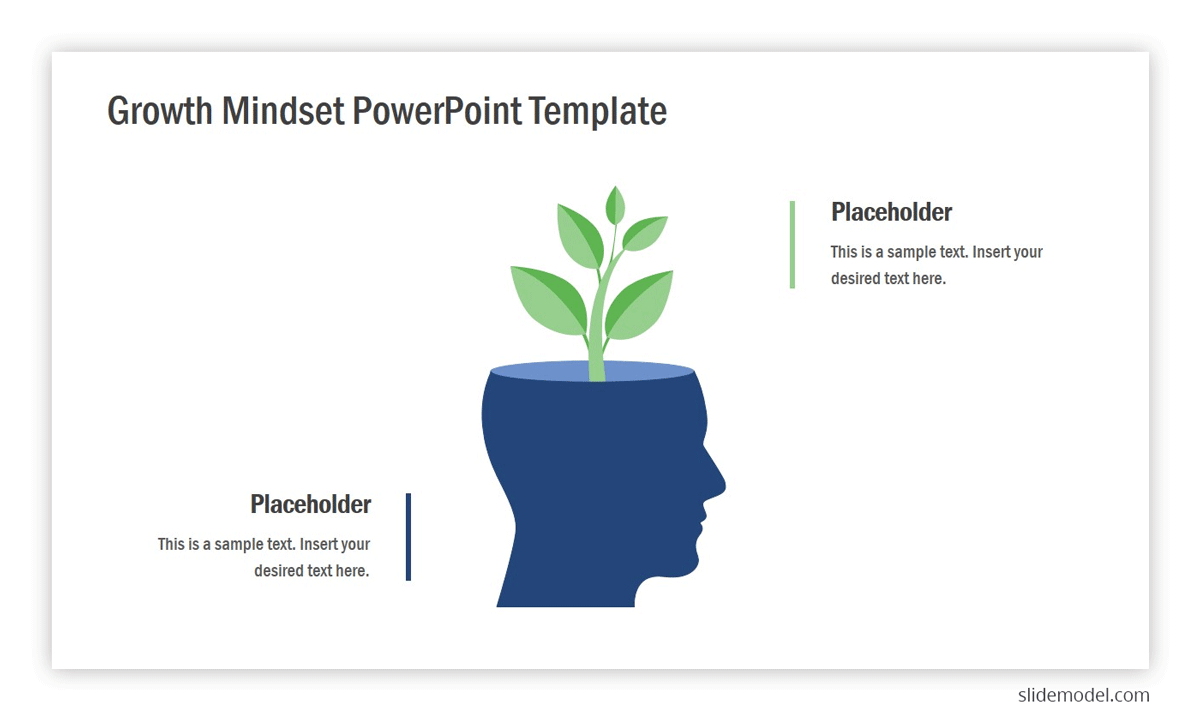
Conclusion
1. Understanding the Entrepreneurial Mindset:
To develop an entrepreneurial mindset, it is essential to understand what it is. An entrepreneurial mindset involves having a vision, being passionate, and taking action toward achieving goals. It requires a willingness to take risks, think outside the box, and embrace change. Understanding these principles is the first step toward developing an entrepreneurial mindset.
2. Setting Clear and Attainable Goals:
Setting clear and attainable goals is crucial to achieving success. Without goals, there is no direction, and without direction, there is no progress. When setting goals, it is important to make them specific, measurable, achievable, relevant, and time-bound. By doing this, you can monitor your progress and make adjustments along the way to stay on track.
3. Developing a Growth Mindset:
Having a growth mindset means embracing challenges and seeing them as opportunities for growth. Instead of viewing failure as a setback, it should be seen as a chance to learn and improve. Developing a growth mindset involves focusing on the process rather than the outcome and being open to new ideas and perspectives.
4. Embracing Risk and Failure:
To be successful in business, one must be willing to take risks and embrace failure. Failure is not a setback but rather a stepping stone to success. It is important to understand that failure is a natural part of the process and that it provides valuable lessons that can help you improve.
5. Creating a Supportive Network:
Creating a supportive network of like-minded individuals is essential in developing an entrepreneurial mindset. Networking allows you to learn from others, gain new perspectives, and build relationships that can help you achieve your goals. It is important to surround yourself with individuals who share your values and beliefs.
6. Staying Focused and Committed:
Staying focused and committed is crucial to achieving success. It requires discipline, dedication, and perseverance. To stay focused, it is important to eliminate distractions and stay organized. Additionally, it is crucial to remain committed to your goals even when faced with obstacles and challenges.

Conclusion:
In conclusion, developing an entrepreneurial mindset is essential to achieving success in today's competitive business world. By following these essential tips and practices, you can master the entrepreneurial mindset and crush your business goals. Remember to set clear and attainable goals, develop a growth mindset, embrace risk and failure, create a supportive network, and stay focused and committed. With the right mindset, anything is possible.

In the highly competitive world of online business, it's important to have a website that is optimized for search engines. Search engine optimization (SEO) is the process of improving the visibility and ranking of your website in search engine results pages (SERPs). There are two main types of SEO: on-page and off-page. In this blog, we'll focus on on-page SEO and its importance in achieving online success.
What is On-Page SEO?
On-page SEO refers to the optimization of individual web pages to improve their ranking and visibility in search engine results. It involves optimizing both the content and the HTML source code of a page to make it more attractive to search engines. The goal of on-page SEO is to make it easier for search engines to crawl, index, and understand your website's content.
Why is On-Page SEO Important?
On-page SEO is crucial for online success because it can help improve your website's visibility in search engine results. By optimizing your website's content and code, you can make it easier for search engines to understand what your website is about and rank it higher in relevant search queries. This can result in increased traffic, more leads, and higher conversions.
Tips for On-Page SEO Optimization
1. Conduct Keyword Research: The first step in on-page SEO optimization is to conduct keyword research to identify the most relevant and profitable keywords for your business. You can use various keyword research tools to identify keywords with high search volumes and low competition.
2. Optimize Title Tags and Meta Descriptions: Title tags and meta descriptions are HTML elements that describe the content of a web page. Optimizing them with relevant keywords can improve your website's click-through rate (CTR) and search engine ranking.
3. Use Header Tags: Header tags (H1, H2, H3, etc.) help organize your content and make it easier for search engines to understand the structure of your website. Using header tags with relevant keywords can improve your website's ranking in search engine results.
4. Optimize Content: The content on your website should be informative, engaging, and optimized with relevant keywords. Make sure to use keywords naturally throughout your content and avoid keyword stuffing.
5. Improve Website Speed: Website speed is a ranking factor in search engine algorithms. To improve your website's speed, you can compress images, reduce HTTP requests, and use a content delivery network (CDN).
6. Make Your Website Mobile-Friendly: With the rise of mobile devices, it's important to have a website that is optimized for mobile users. Make sure your website is mobile-friendly by using responsive design and optimizing images for mobile devices.
7. Use Internal Linking: Internal linking is the practice of linking to other pages within your website. It helps search engines understand the structure of your website and can improve user engagement. Make sure to use descriptive anchor text with relevant keywords when linking to other pages.
8. Optimize Images: Images are an important part of your website's content, but they can also slow down your website if they're not optimized. Make sure to compress images, use descriptive filenames, and use alt text with relevant keywords.
9. Create Unique Meta Titles and Descriptions: Each page on your website should have a unique meta title and description that accurately describes the content of the page. Make sure to include relevant keywords and keep the meta title under 60 characters and the meta description under 160 characters.
10. Improve User Experience: User experience (UX) is an important factor in search engine algorithms. Make sure your website is easy to navigate, has a clear hierarchy, and is visually appealing. Use a clean and simple design with easy-to-read fonts and colors.
11. Monitor Your Website's Performance: Regularly monitor your website's performance using tools like Google Analytics and Search Console. Analyze your website's traffic, bounce rate, and click-through rate (CTR) to identify areas for improvement and make data-driven decisions.
12. Add Schema Markup: Schema markup is a type of structured data that helps search engines understand the content on your website. By adding schema markup to your website, you can improve your website's visibility in search engine results and attract more traffic.
13. Optimize URLs: URLs should be short, descriptive, and include relevant keywords. Avoid using long and confusing URLs that are difficult for users to remember and search engines to crawl.
14. Use Social Sharing Buttons: Social media can drive traffic to your website and improve your website's visibility. Make sure to include social sharing buttons on your website to encourage users to share your content on social media.
15. Add a Sitemap: A sitemap is a file that lists all the pages on your website. It helps search engines crawl and indexes your website more efficiently. Make sure to submit your sitemap to search engines to improve your website's visibility.
16. Improve Readability: Make sure your content is easy to read and understand. Use short paragraphs, headings, and bullet points to break up large blocks of text. Also, use a readable font size and avoid using light font colors on a white background.
17. Monitor Keyword Density: Avoid overusing keywords in your content, as this can be seen as keyword stuffing and can result in penalties from search engines. Aim for a keyword density of 1-2% to ensure your content is optimized without being spammy.
18. Improve Page Speed: Page speed is an important ranking factor, as users expect fast-loading websites. Use tools like Google PageSpeed Insights to analyze your website's speed and identify areas for improvement. Optimize images, use browser caching, and minify CSS and JavaScript to improve your website's page speed.
19. Use Header Tags: Header tags (H1, H2, H3, etc.) help search engines understand the structure of your content. Use header tags to break up content into sections and make sure to include relevant keywords in your headers.
20. Optimize for Mobile Devices: Mobile devices now account for the majority of online traffic, so it's important to ensure your website is optimized for mobile devices. Use a responsive design and make sure your website is easy to navigate on a smaller screen.
21. Use External Links: External links to authoritative sources can improve your website's credibility and trustworthiness. Make sure to use external links sparingly and only link to high-quality sources that are relevant to your content.
22. Use Canonical Tags: If you have multiple pages with similar content, use canonical tags to tell search engines which page is the primary page. This can help prevent duplicate content issues and ensure that the correct page is indexed.
23. Optimize Your Title Tags: Your title tag is one of the most important on-page SEO factors. Make sure your title tag accurately describes the content on your page and includes relevant keywords. Keep your title tag under 60 characters to ensure it displays properly in search engine results.
Remember, on-page SEO optimization is just one part of a comprehensive SEO strategy. In addition to on-page optimization, make sure to also focus on off-page optimization, such as link building and social media marketing. By using a holistic approach to SEO, you can improve your website's visibility, attract more traffic, and ultimately drive more conversions.

Maa Khushmanda, also known as Kushmanda Devi or the fourth form of Navdurga, is a Hindu goddess worshipped during the nine-day festival of Navratri. Her name is derived from two Sanskrit words: "khush" which means happiness or pleasure, and "manda" which means slow or dull. Therefore, she is believed to bring happiness and light into the lives of her devotees.
Maa Kushmanda is depicted as a radiant and powerful goddess, with eight arms and a radiant smile. She rides a lion, symbolizing courage and strength, and holds various objects in her hands, each with a symbolic meaning. Her right hands hold a mala (rosary) and a lotus, while her left hands hold a kamandalu (water pot) and a bow and arrow. She also holds a chakra (discus), a gada (mace), a sword, and a shield, representing her power and protection.
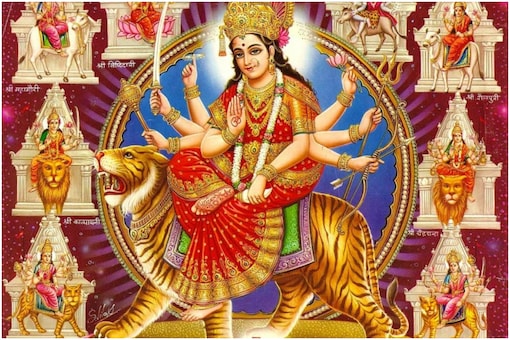
Devotees believe that worshipping Maa Khushmanda during Navratri can bring them prosperity, success, and happiness. Her worship is said to bring positive energy and remove all obstacles in life. It is also believed that her blessings can help in getting rid of diseases and other health-related problems.
During the nine-day festival of Navratri, devotees perform various rituals and puja to worship Maa Khushmanda. It is believed that offering fruits, flowers, and sweets to her can please her and bring her blessings. Devotees also sing devotional songs and offer prayers to seek her blessings.
Maa Khushmanda is also associated with the Manipura Chakra, which is the third chakra in the human body. This chakra is located in the abdomen, and it is believed to be responsible for the digestive system and metabolism. Therefore, worshipping Maa Khushmanda is said to bring balance to this chakra and improve overall health.
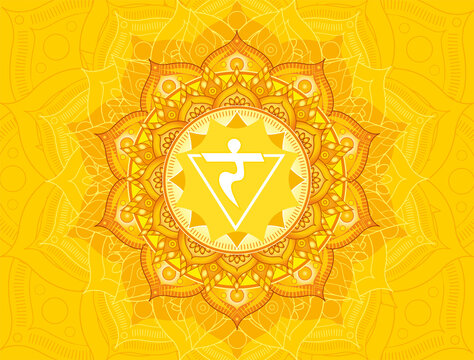
According to legend, when there was only darkness and void, Maa Kushmanda created the universe by releasing her divine energy. It is believed that she resides in the core of the sun and radiates her divine energy in all directions, creating and sustaining life on earth.
The festival of Navratri is dedicated to the worship of Maa Kushmanda and is celebrated with great fervor and devotion across India. Devotees offer flowers, fruits, and sweets to the goddess, and recite prayers and hymns in her honor. It is believed that worshipping Maa Kushmanda during Navratri can bring prosperity, good health, and success in all endeavors.
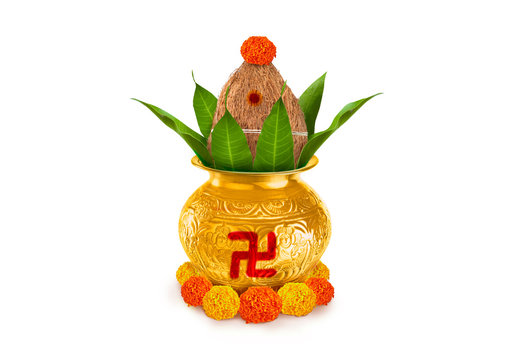
Apart from her role as the creator of the universe, Maa Kushmanda is also associated with the Manipura chakra, which is located in the solar plexus region of the body. This chakra is associated with the qualities of courage, self-confidence, and willpower, and is said to be the source of one’s creative energy. By meditating on Maa Kushmanda and the Manipura chakra, one can awaken their inner creative energy and overcome obstacles in life.
In conclusion, Maa Kushmanda is a powerful and radiant goddess who represents the creative energy of the universe. Her worship during Navratri can bring blessings of prosperity, good health, and success, while meditating on her can awaken the inner creative energy and help overcome obstacles in life. Let us bow down to Maa Kushmanda and seek her blessings for a happy and prosperous life.

Happy Krishna Janmashtami 2022: Wishes, Messages, Quotes and WhatsApp Greetings in English and Hindi to Share on Janmashtami
HAPPY KRISHNA JANMASHTAMI 2022 WISHES QUOTES, STATUS, MESSAGES: Krishna Janmashtami, an auspicious Hindu festival, is celebrated every year with great fervour across the nation. The day marks the birthday of Lord Krishna, who is said to be the Purna Avatar or complete manifestation of the supreme cosmic energy. Janmashtami celebrations are incomplete without Dahi Handi, an earthen pot filled with dahi (curd) or makhan (butter), which is hung at a height.
People compete with one another to break this earthen pot on the holy day. Besides organising puja, you can also greet your loved ones on this special occasion by sending these wishes and quotes.
To help you send the best wishes to your loved ones, we have curated a list of heartwarming wishes and quotes. Check it out:
Krishna Janmashtami 2022 : Quotes and Wishes :
श्री कृष्ण गोविन्द हरे मुरारी,
हे नाथ नारायण वासुदेवा।
कृष्ण जन्माष्टमी की शुभकामनाएं!
एक मात्र स्वामी तुम सखा हमारे
हे नाथ नारायण वासुदेवा।
कृष्ण जन्माष्टमी की शुभकामनाएं!
गोविंद जय जय, गोपाल जय जय
राधा रमण हरी, गोविंद जय जय।
कृष्ण जन्माष्टमी की शुभकामनाएं!
नंद के घर आनंद भयो, जय कन्हैया लाल की
हाथी घोड़ा पालकी, जय कन्हैया लाल की।
कृष्ण जन्माष्टमी की शुभकामनाएं!
हरे कृष्ण, हरे कृष्ण, कृष्ण कृष्ण, हरे हरे।
हरे राम, हरे राम, राम राम, हरे हरे।।
कृष्ण जन्माष्टमी की शुभकामनाएं!
1. May all the paths lead home and all your worries are taken care of by Lord Krishna. Happy Krishna Janmashtami wishes to you and your family!
2. May Lord Krishna steal all your tensions and worries on this Janmashtmi! And give you all the love, peace and happiness! Happy Krishna Janmashtami.
3. May Lord Krishna rid you of all your worries on this day. Happy Janmashtami!
4. It is the day when Makhan chor is born. May this day he steals all your worries and bless you with the sweetness of Makhan and mishri in life. A very Happy Janmashtami to you!
5. May da Natkhat Nandlal always give you many reasons to be Happy and you find peace in Krishna’s consciousness. Happy Janmashtami.

Women's cricket has come a long way since its inception in the 18th century, and the Women's Premier League (WPL) has played a significant role in its growth. The WPL is a professional Twenty20 cricket league for women, which was first introduced in England in 2015. The tournament has since become an annual event, and it features some of the best female cricketers from around the world.
The inaugural season of the Women's Premier League was held in 2015, with six teams taking part. These teams were Western Storm, Loughborough Lightning, Surrey Stars, Southern Vipers, Yorkshire Diamonds, and Lancashire Thunder. The tournament followed a round-robin format, with each team playing each other once before the top four teams advanced to the semi-finals.

The first-ever WPL champions were Southern Vipers, who defeated Western Storm in the final to claim the title. The Vipers were led by Charlotte Edwards, who was one of the most successful female cricketers of all time. She was also named the player of the tournament, thanks to her impressive performances with the bat.
Since then, the Women's Premier League has grown in popularity, attracting more fans and top-quality players from around the world. In 2016, the league expanded to include eight teams, with the addition of the Surrey Stars and Lancashire Thunder. The following year, the league added a ninth team, the Western Storm Academy, which was a developmental squad.
Over the years, the Women's Premier League has produced some memorable moments, including incredible performances by some of the game's biggest stars. Some of the most notable players to have taken part in the tournament include Suzie Bates, Meg Lanning, Ellyse Perry, Heather Knight, and Anya Shrubsole.
In terms of winners, Southern Vipers have won the tournament twice, in 2016 and 2017, while Surrey Stars won their first title in 2018. Western Storm has been the most successful team in the history of the competition, winning three titles in 2017, 2019, and 2021. In 2020, the tournament was canceled due to the COVID-19 pandemic.
In conclusion, the Women's Premier League has played a significant role in promoting women's cricket around the world. It has provided a platform for female cricketers to showcase their skills and has helped to increase the popularity of the sport. With the competition set to continue in the coming years, it is likely that we will see even more top-quality cricket from some of the world's best female players.
The WPL is a Twenty20 (T20) cricket league, which means that each team has a maximum of 20 overs to score as many runs as possible. The league features six teams, each representing a different city in India. The teams are the Supernovas (representing Jaipur), Trailblazers (representing Mumbai), Velocity (representing Kolkata), Thistles (representing Mohali), Challengers (representing Bangalore), and the defending champions, the Supernovas.
The inaugural season of the WPL was played in May 2019 and featured some of the best female cricketers in the world. The league was played over the course of 10 days, with each team playing the other twice in a round-robin format. The top four teams at the end of the round-robin stage qualified for the semi-finals, with the winners of those matches progressing to the final.
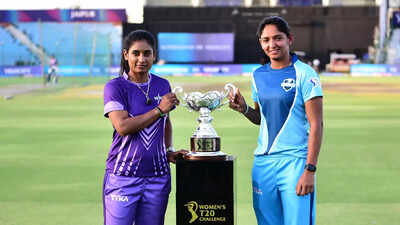
In the end, it was the Supernovas who emerged as the champions of the first-ever WPL. Led by the Australian captain, Meg Lanning, the Supernovas defeated the Trailblazers by four wickets in a thrilling final. The match featured some fantastic performances from both teams, with Harmanpreet Kaur (Supernovas) and Smriti Mandhana (Trailblazers) scoring half-centuries.
The WPL has since gone from strength to strength, with the league attracting more and more fans every year. The league has also played a crucial role in the development of female cricket in India, with many young girls now looking up to the players in the WPL as role models and inspiration.

Yoga is an ancient practice that has gained immense popularity worldwide due to its holistic approach to well-being. Every year, on June 21st, International Yoga Day is celebrated to highlight the significance of yoga in promoting physical, mental, and spiritual wellness. In this blog, we will explore the transformative power of yoga and how it leads us on a path to overall wellness.

The Essence of Yoga
Yoga, derived from the Sanskrit word "Yuj," means union or connection. It is a practice that brings harmony between the body, mind, and spirit. Through a combination of physical postures (asana), breath control (pranayama), and meditation, yoga helps individuals achieve a state of balance and inner peace.
Physical Wellness through Yoga
Yoga offers numerous benefits for physical health. Regular practice enhances flexibility, strength, and balance. The various asanas work on different muscle groups, promoting toning and improved posture. Additionally, yoga stimulates blood circulation, boosts the immune system, and aids in detoxification, contributing to overall vitality and well-being.
Mental and Emotional Well-being
Yoga is not just about physical exercise; it also nurtures mental and emotional wellness. Through breath-focused practices like pranayama, individuals learn to cultivate mindfulness, reduce stress, and achieve mental clarity. Yoga helps manage anxiety, depression, and other mental health conditions by promoting relaxation and balancing neurotransmitters in the brain. It also enhances self-awareness and fosters a positive mindset.
Spiritual Connection and Inner Growth
One of the fundamental aspects of yoga is its ability to connect individuals with their spiritual selves. Through meditation and deep introspection, practitioners tap into their inner wisdom and discover a sense of purpose and meaning in life. Yoga encourages self-reflection, compassion, and gratitude, leading to personal transformation and spiritual growth.
Yoga as a Lifestyle
International Yoga Day serves as a reminder to incorporate yoga into our daily lives beyond the mat. By embracing yoga as a lifestyle, we can extend its benefits into every aspect of our existence. This includes adopting mindful eating habits, practicing kindness and compassion towards others, and cultivating a positive and harmonious environment around us.
Spreading Awareness and Celebrating Yoga Day
International Yoga Day is an occasion to celebrate and spread awareness about the importance of yoga. It is marked by various events, workshops, and community gatherings worldwide. People come together to participate in group yoga sessions, share their experiences, and learn from each other. This collective energy amplifies the positive impact of yoga and inspires more individuals to embark on their wellness journey.
Embracing Yoga's Path to Wellness
On International Yoga Day, we can take a moment to reflect on our own journey with yoga. It is an opportunity to acknowledge the positive changes it has brought to our lives and to express gratitude for the ancient wisdom that has been passed down through generations. By embracing yoga's path to wellness, we not only transform ourselves but also contribute to a healthier and more harmonious world.
Conclusion:
International Yoga Day is a global celebration that reminds us of the profound impact yoga has on our physical, mental, and spiritual well-being. As we mark this special day, let us remember that yoga is not just an exercise or a series of postures but a path that leads us to discover our true selves and find balance in all aspects of life. By embracing yoga's teachings and incorporating them into our daily lives, we embark on a transformative journey toward wellness and inner peace.

Website architecture is the foundation of any successful website. It is the design and layout of a website's pages, structure, and navigation. A well-designed website architecture can improve user experience, increase search engine rankings, and boost overall performance. In this blog, we will explore the different aspects of website architecture and how it can impact your online presence.
1. Planning your website architecture
Before you start building your website, you need to plan its structure. You should start by identifying the purpose of your website, the target audience, and the type of content you will be publishing. This will help you create a clear and logical structure that is easy to navigate. You should also consider the user flow and how users will interact with your website. The easier it is for users to find what they are looking for, the more likely they are to stay on your site.
2. Organizing your content
The next step is to organize your content into categories and subcategories. This will make it easier for users to find the information they need. You should also consider the hierarchy of your content and how it should be presented. The most important content should be prominently displayed, while less important content should be placed in secondary locations.
3. Navigation
Navigation is a critical aspect of website architecture. Your navigation should be easy to use and understand. Users should be able to find what they are looking for quickly and easily. You can achieve this by using clear labels and organizing your content logically. You should also consider the use of drop-down menus and breadcrumb trails to help users navigate your site.
4. Design
The design of your website should reflect your brand and be consistent across all pages. Your website should be visually appealing and easy to read. You should also consider the use of whitespace to make your content stand out. You should also ensure that your website is responsive and can be viewed on different devices.
5. SEO
Website architecture can impact your search engine rankings. A well-structured website with clear navigation and organized content can improve your SEO. You should also consider the use of keywords in your URLs, titles, and descriptions. This will help search engines understand the content of your website and rank it accordingly.
6. Performance
Website architecture can also impact the performance of your website. A well-designed website will load quickly and be easy to use. You should consider the use of caching and compression to improve load times. You should also ensure that your website is optimized for mobile devices.
7. Scalability
Scalability is another important aspect of website architecture. You should design your website to be scalable, meaning it can handle an increase in traffic and content without sacrificing performance. This involves using a scalable hosting solution, such as cloud hosting, and designing your website with scalability in mind.
8. Security
Website architecture can also impact the security of your website. You should consider implementing security measures, such as SSL certificates and firewalls, to protect your website from cyber attacks. You should also ensure that your website is up-to-date with the latest security patches and updates.
9. Analytics
Website architecture can also impact your ability to track website analytics. You should consider implementing analytics tools, such as Google Analytics, to track user behavior and measure the success of your website. You should also ensure that your website architecture allows for easy integration with analytics tools.
10. Testing and optimization
Once your website is live, you should test and optimize it regularly. This involves monitoring website performance, tracking user behavior, and making changes to improve user experience and search engine rankings. You should also consider using A/B testing to compare different website designs and layouts.
11. Content management system (CMS)
A content management system (CMS) is a software application that allows you to create, manage, and publish digital content on your website. A CMS can help you to easily organize your content, update your website quickly and efficiently, and manage user access levels. You should choose a CMS that is scalable, secure, and easy to use for your website architecture.
12. Accessibility
Website accessibility is the practice of designing and developing websites that can be used by people with disabilities. A well-designed website architecture should take accessibility into account by using proper markup, ensuring that content is easily navigable, and making sure that media is properly described. This can help you to reach a wider audience and ensure that your website is compliant with accessibility guidelines.
13. User experience (UX)
User experience (UX) refers to the overall experience that a user has when interacting with your website. A well-designed website architecture should prioritize UX by making it easy for users to find what they are looking for, providing clear calls-to-action, and ensuring that content is easy to read and understand. UX can impact how users perceive your brand and whether they return to your website in the future.
14. Mobile-first design
With the increasing number of mobile users, website architecture should prioritize mobile-first design. This means designing your website with the mobile user in mind, such as using responsive design to ensure that your website adapts to different screen sizes. You should also consider optimizing your website for mobile devices, such as using touch-friendly buttons and designing a clear and concise mobile navigation.
15. Maintenance
Website architecture requires ongoing maintenance to ensure that it continues to perform at an optimal level. You should regularly check for broken links, optimize images, and update your website's software to ensure that it is secure and up-to-date. By prioritizing website maintenance, you can ensure that your website remains functional and effective.
16. Performance optimization
Website architecture can impact the performance of your website, including its speed and load times. You should consider implementing performance optimization techniques, such as minimizing image and file sizes, caching, and optimizing code, to ensure that your website loads quickly and efficiently. A faster website can improve user experience and search engine rankings.
17. Search engine optimization (SEO)
Search engine optimization (SEO) is the practice of improving your website's visibility in search engine results pages (SERPs). A well-designed website architecture can impact your website's SEO by using proper markup, including relevant keywords, and optimizing your website's content for search engines. You should also consider implementing a sitemap and submitting it to search engines to ensure that your website is easily discoverable.
18. Branding
Website architecture can also impact your brand identity by incorporating branding elements, such as logos and color schemes, into your website's design. A well-designed website architecture can help to create a cohesive brand identity across all of your digital channels, including your website and social media profiles.
19. Conversion optimization
Conversion optimization involves designing your website to encourage users to take a specific action, such as making a purchase or filling out a contact form. A well-designed website architecture should prioritize conversion optimization by including clear calls-to-action, providing social proof, and optimizing landing pages for maximum conversions.
20. Collaboration
Website architecture often involves collaboration between designers, developers, content creators, and other stakeholders. You should choose a project management tool that allows for easy collaboration and communication, such as Trello or Asana. By prioritizing collaboration, you can ensure that everyone involved in the website architecture process is on the same page and working towards a common goal.
21. Security
Website security is crucial to protecting your website and its users from potential threats, such as hacking attempts and malware. You should consider implementing security measures, such as SSL certificates, firewalls, and regular security updates, to ensure that your website remains secure. Prioritizing website security can also help to build trust with your users and improve your website's reputation.
22. Analytics
Website analytics can provide valuable insights into your website's performance, including user behavior, traffic sources, and conversion rates. You should consider implementing an analytics tool, such as Google Analytics, to track your website's performance and make data-driven decisions. Analytics can also help to identify areas for improvement in your website architecture.
23. Scalability
Website scalability refers to the ability of your website to handle increased traffic and content over time. A well-designed website architecture should prioritize scalability by using a scalable hosting solution and ensuring that the website's structure and code can handle increased traffic and content. Prioritizing scalability can help to future-proof your website and avoid potential performance issues as your website grows.
24. Testing
Website testing is crucial to identifying and fixing potential issues before they impact your users. You should consider implementing a testing plan, such as A/B testing, to identify areas for improvement in your website architecture. Testing can also help to ensure that your website is functioning correctly and providing the best possible user experience.
25. User Feedback
User feedback can provide valuable insights into your website's performance and user experience. You should consider implementing a feedback mechanism, such as a survey or feedback form, to collect feedback from your users. User feedback can help to identify areas for improvement in your website architecture and provide valuable insights into your users' needs and preferences.
In conclusion, website architecture is a complex process that involves many aspects, such as design, SEO, performance, branding, collaboration, security, analytics, scalability, testing, and user feedback. By prioritizing these aspects, you can create a website that is easy to use, visually appealing, secure, and optimized for search engines. Regular maintenance and optimization will help you to maintain and improve your website's performance over time, while user feedback and testing can help to ensure that your website is providing the best possible user experience.

India's first-ever 5G spectrum auction ends, and total bids cross ₹1.5 lakh crore
India's first-ever 5G spectrum auction has concluded, Union Minister Ashwini Vaishnav said on Monday. The total bid amount for the sale of airwaves was over ₹1.5 lakh crore at the end of the auction. Out of the 72 GHz of the spectrum that was put up for auction, around 51 GHz has been sold, Vaishnaw said.
Jio was the only applicant to have acquired spectrum in the coveted 700 Mhz bands, which industry analysts say will give it a significant headstart over its competitors as far as consumer penetration of 5G is concerned.
The auction went on for many more days and rounds than planned, belying expectation among telecom companies that most of the spectrum would be sold at the base price and would be over in two days.
No one anticipated a bitter battle between the three telecom companies for the 10.8 MHz of spectrum in the 1800 band in the eastern Uttar Pradesh circle. The battle resulted in prices soaring over the base price.
Government sources said they had estimated earning between Rs 70,000 crore and Rs 110,000 crore, but guess did better because reportedly Reliance Jio decided to buy 10 MHz of spectrum in the 700 bands. The company, said analysts, would have forked out Rs 39,270 crore for the band as a result of which the overall numbers hit a much higher mark.
According to Telecom Minister Ashwini Vaishnaw, the Adani group bought 400 MHz, or less than one percent of all spectrum sold, for ₹ 212 crores.
Read More...

Maa Katyayani is one of the nine forms of Goddess Durga, who is worshipped during the auspicious occasion of Navratri. Navratri is a nine-day festival celebrated in the Hindu religion, which is dedicated to worshipping the nine forms of Goddess Durga. The festival usually falls in the months of September or October, according to the Hindu calendar.
Maa Katyayani is believed to be the warrior goddess who rides a lion and is worshipped as the epitome of courage, power, and strength. The goddess is depicted with four arms, holding a sword, a lotus, and a mudra that symbolizes blessings and protection. She is often adorned with red clothes, and her complexion is said to be golden.

According to Hindu mythology, Maa Katyayani was born to a sage named Katyayan, who was an ardent devotee of Goddess Durga. As per the legend, the sage performed rigorous penance to please the goddess, and in return, she appeared before him in the form of his daughter. She is also believed to have manifested to slay the demon Mahishasura.
The story of Maa Katyayani goes back to the time when the demon Mahishasura had defeated the gods and taken control of the universe. The gods, unable to defeat the demon, approached Lord Vishnu for help, who advised them to seek the help of Goddess Parvati. Parvati, in response to their plea, took the form of Maa Katyayani to fight Mahishasura.
Maa Katyayani is depicted as a fierce warrior goddess, riding a lion and carrying weapons such as a sword, trident, and lotus. She is also known as the goddess of love and devotion, as she is believed to help devotees in finding their soulmates and overcome obstacles in their love lives.
During Navratri, devotees perform puja (worship) of Maa Katyayani, offering her flowers, fruits, and sweets. They also recite her mantras and sing hymns in her praise. It is believed that worshipping Maa Katyayani during Navratri helps in removing obstacles and achieving success in life.
Apart from Navratri, Maa Katyayani is also worshiped on Tuesdays and Fridays, as these are considered auspicious days for her worship. Devotees fast and offer prayers to Maa Katyayani on these days, seeking her blessings for a happy and prosperous life.
The worship of Maa Katyayani is believed to grant courage, strength, and the ability to overcome obstacles. Devotees offer prayers, perform rituals, and observe fasts during the nine-day festival of Navratri. They also offer flowers, sweets, and other items to the goddess and seek her blessings.
Maa Katyayani is also associated with the Manipura Chakra, which is believed to be the center of willpower and self-esteem. The worship of Maa Katyayani is said to activate this chakra, which in turn helps in developing self-confidence and the ability to make decisions
In conclusion, Maa Katyayani is a powerful and revered goddess in Hindu mythology, worshipped for her strength, courage, and love. Her devotees seek her blessings for success in all aspects of life, including love, marriage, and career. Her worship during Navratri and on auspicious days is believed to bring happiness, prosperity, and fulfillment to one's life.


As artificial intelligence (AI) continues to advance, its impact on various industries is becoming increasingly apparent. From healthcare and finance to manufacturing and education, AI has the potential to revolutionize the way we work and live. In this blog post, we will explore how AI is likely to affect different industries in the future.
-
Healthcare: AI has already made significant strides in the healthcare industry, from improving diagnostics to drug discovery. In the future, AI-powered devices and algorithms could help physicians make more accurate diagnoses and treatment recommendations. AI could also help to identify patients at risk of developing certain conditions, allowing for earlier interventions and better outcomes.
-
Finance: AI is already being used in the finance industry to detect fraud, analyze market trends, and automate routine tasks. In the future, AI could play an even greater role in the industry, from personalized financial advice to fully automated investing.
-
Manufacturing: AI is already being used in manufacturing to improve efficiency and reduce costs. In the future, AI-powered robots could take over many of the tasks currently performed by humans, leading to greater productivity and cost savings.
-
Education: AI has the potential to transform education by personalizing learning experiences and providing more effective feedback to students. AI-powered tutoring systems could help students learn at their own pace and provide targeted support for areas where they are struggling.
-
Transportation: AI is already being used in the transportation industry to improve safety and efficiency. In the future, autonomous vehicles could transform the way we travel, from reducing traffic congestion to improving road safety.
-
Retail: AI-powered chatbots and recommendation engines are already being used in retail to provide personalized shopping experiences for customers. In the future, AI could play an even greater role in the industry, from predicting consumer trends to optimizing supply chain management.
-
Energy: AI has the potential to transform the energy industry by optimizing energy consumption, reducing waste, and improving the efficiency of renewable energy sources.
In conclusion, the impact of AI on different industries is likely to be significant in the future. While there are potential benefits, there are also concerns about the potential job loss and the ethical implications of AI. However, if managed correctly, AI has the potential to revolutionize the way we live and work, leading to greater efficiency, productivity, and innovation in a wide range of industries.
Read More: Boost Your Ranking: Top SEO Tools | How to make Android Expense Monitor Application with MVVM - Part 1 (of 4)

Skandamata is a Hindu goddess who is worshipped on the fifth day of Navratri, a nine-day Hindu festival that celebrates the triumph of good over evil. Skandamata is the mother of Skanda or Kartikeya, the Hindu god of war, and is a form of Goddess Durga.
Skandamata is depicted as a four-armed goddess, holding a lotus flower and a bell in her upper hands, while her lower hands are in the Abhaya Mudra (gesture of fearlessness) and the Varada Mudra (gesture of granting boons). She rides on a lion, which represents power and courage. and her complexion is golden, signifying prosperity.

According to Hindu mythology, Skandamata was born to Lord Vishnu as his daughter in the form of Shakti. She married Lord Shiva and gave birth to Lord Skanda. Skandamata is considered to be a benevolent and compassionate goddess who blesses her devotees with courage, strength, and success. She is also known for her maternal love and protection.
Worshipping Skandamata during Navratri is believed to bring peace, prosperity, and happiness to one's life. Devotees offer her flowers, fruits, sweets, and other offerings to seek her blessings. Reciting Skandamata's mantra, "Om Devi Skandamatayai Namah," is also considered auspicious and helps in attaining spiritual and material benefits.
Skandamata is a symbol of motherhood and represents the divine feminine energy in Hinduism. She reminds us of the importance of maternal love and protection in our lives. By worshipping Skandamata, we can connect with our inner strength and overcome our fears and obstacles.
Skandamata is considered a very powerful goddess, and her worship is believed to bring peace, prosperity, and happiness to her devotees. It is said that worshipping Skandamata on the fifth day of Navratri can help overcome all kinds of difficulties and obstacles in life.
To perform Skandamata puja, devotees usually clean their homes and decorate their puja rooms with flowers and rangolis. They offer lotus flowers, fruits, and sweets to the goddess and chant mantras and hymns in her praise.
Skandamata is also associated with the Svadhisthana chakra, which is located at the base of the spine and is associated with emotions, creativity, and sensuality. It is believed that meditating on Skandamata and focusing on this chakra can help balance emotions and improve creativity.
In addition to her role as a mother and protector, Skandamata is also believed to have the power to destroy negative energy and protect her devotees from harm. It is said that worshipping her with devotion and faith can help them overcome all kinds of obstacles and lead to success in all areas of life.
The significance of Skandamata can be traced back to ancient Hindu texts such as the Devi Mahatmya, which describes the various forms of the goddess Durga. Skandamata is also mentioned in the Skanda Purana, which is dedicated to Lord Kartikeya.
In conclusion, Skandamata is an important deity in Hindu mythology and is worshipped with great devotion and reverence during the Navratri festival. She is a symbol of motherhood and represents the power of love, compassion, and protection. By worshipping Skandamata, we can gain her blessings and guidance in our lives.

Mahagauri is one of the nine forms of Goddess Durga, worshipped during the auspicious occasion of Navratri. She is the eighth avatar of the Hindu goddess Durga and is known for her purity and serenity. Mahagauri is believed to be the epitome of peace, prosperity, and good luck. Her name "Mahagauri" is derived from two Sanskrit words, "Maha," which means "great," and "Gauri," which means "white," symbolizing purity.
According to Hindu mythology, Mahagauri's name and form came about after Parvati, the wife of Lord Shiva, performed severe penance for several years to attain him as her husband. Due to the intensity of her penance, her skin became dark, and she came to be known as Kali (meaning black). However, Lord Shiva blessed her and washed her with the holy waters of the Ganges River, restoring her original fair complexion and purity. It is believed that by worshipping Mahagauri, one can attain spiritual purity and the blessings of the divine mother.
Devotees of Mahagauri observe fasts and perform puja (worship) during the eight days of Navratri. On the eighth day, they offer white clothes, flowers, and sweets to the goddess and sing hymns and devotional songs in her honor. The puja rituals conclude with the 'visarjan, or immersion, of the goddess's idol in a nearby water body.
Mahagauri is depicted as a beautiful woman with four arms, riding on a white bull or a lion. She holds a trident and a damaru (a small drum) in her two hands, while the other two hands are in the mudras of "veranda" and "Abhaya," symbolizing her blessings and fearlessness, respectively. Her serene and gentle nature is depicted through her attire, which is a simple white sari with no jewelry or heavy adornments.
Mahagauri is worshipped on the eighth day of Navratri, and her devotees seek her blessings for purity, peace, and prosperity. It is believed that worshipping Mahagauri on this day removes all the impurities and sins from one's life, and the devotee becomes pure, both spiritually and physically. Mahagauri is also worshipped during the festival of Durga Puja, along with other forms of Durga, by Hindus all over the world.
Mahagauri is worshipped on the eighth day of Navratri, which is also known as Ashtami. It is believed that worshipping her can help in purifying the mind, body, and soul. Devotees offer white flowers, coconut, and sweets to the goddess as a symbol of their devotion.
Mahagauri is also associated with the planet Rahu, which is considered a malefic planet in Hindu astrology. It is believed that worshipping her can help reduce the negative effects of Rahu and bring success and prosperity.
In conclusion, Mahagauri is a revered form of Goddess Durga and represents purity, calmness, and spiritual enlightenment. Her worship during Navratri can help one attain inner peace, overcome obstacles, and achieve success in life. By invoking her blessings, one can lead a life filled with happiness, prosperity, and spiritual fulfillment.

Writing a blog or website content that is both plagiarism-free and SEO-friendly is crucial in today's digital age. A plagiarism-free content ensures that your work is original and not copied from any other sources. On the other hand, SEO-friendly content is optimized for search engines to improve your website's ranking and increase traffic.
Here are some tips on how to write plagiarism-free and SEO-friendly content:
-
Research and Gather Information: Start by researching your topic and gathering information from credible sources. This will help you to have a better understanding of the topic, and you can use the information to create your unique content.
-
Create an Outline: Create an outline of your blog or website content before starting to write. This will help you to organize your ideas and ensure that you cover all the necessary points.
-
Use Plagiarism Checker Tools: Always use plagiarism checker tools to ensure that your content is original. There are many free online tools available that can help you to check for plagiarism, such as Grammarly, Turnitin, Copyscape, etc.
-
Use Proper Citation: If you have to use any information or quote from other sources, make sure to give proper citation and credit to the original source. This will help you to avoid plagiarism and also improve the credibility of your content.
-
Use Keywords and Phrases: Use relevant keywords and phrases in your content to optimize it for search engines. This will help your website to rank higher in search results and attract more traffic.
-
Write in Simple Language: Use simple language and avoid using complex jargon or technical terms that may confuse your readers. Keep your content easy to read and understand.
-
Use Headings and Subheadings: Use headings and subheadings to break down your content into smaller sections. This will make it easier for your readers to read and understand your content, and also help search engines to crawl your content more efficiently.
-
Use Visuals: Use relevant images, videos, and infographics to make your content more engaging and visually appealing. This will help to keep your readers engaged and also improve the overall user experience.
Read More: Here are the top 5 plagiarism checker sites | How to Make Money Online with ChatGPT
In conclusion, writing plagiarism-free and SEO-friendly content requires effort and attention to detail. By following these tips, you can create content that is original, informative, and optimized for search engines, which can help to drive traffic to your website and increase engagement with your audience.

Artificial intelligence (AI) has been one of the most transformative technologies of the 21st century. From healthcare to finance, retail to transportation, AI has disrupted traditional business models and has the potential to revolutionize the way we live and work. In this blog post, we will explore the impact of AI on diverse industries, the opportunities it presents, and the challenges it poses.
Healthcare
One of the most significant impacts of AI has been in the healthcare industry. AI-powered diagnostic tools can analyze medical data with unprecedented accuracy and speed, leading to more accurate diagnoses and more effective treatments. AI can also help healthcare providers manage patient data more efficiently and improve patient outcomes. Additionally, AI-powered robots can perform surgeries with greater precision, reducing the risk of human error.
Despite these benefits, the use of AI in healthcare has raised concerns about patient privacy and the ethical implications of using AI to make life-or-death decisions. Additionally, the adoption of AI in healthcare requires significant investment in technology and training, which can be a barrier to entry for some healthcare providers.
Finance
AI is also having a significant impact on the finance industry. With the help of AI, financial institutions can analyze vast amounts of data and make more informed investment decisions. AI-powered chatbots can also provide personalized financial advice and customer service, improving the customer experience. Additionally, AI can help detect fraudulent activity more quickly and accurately. However, the use of AI in finance also raises concerns about privacy and security. Financial institutions must ensure that the personal and financial data they collect is protected from cyber threats. Additionally, the use of AI in finance could lead to job losses as AI-powered systems take over tasks traditionally performed by humans.
Retail
AI is transforming the retail industry by improving the customer experience and streamlining operations. AI-powered chatbots can provide personalized customer service, while AI-powered recommendation engines can suggest products that are tailored to each customer's preferences. Additionally, AI can help retailers manage inventory more efficiently, reducing waste and improving profitability. However, the use of AI in retail has also raised concerns about privacy and security. Retailers must ensure that the personal and financial data they collect is protected from cyber threats. Additionally, the adoption of AI in retail could lead to job losses as AI-powered systems take over tasks traditionally performed by humans.
Transportation
AI is also having a significant impact on the transportation industry. AI-powered self-driving cars can reduce traffic accidents and improve traffic flow. Additionally, AI-powered logistics systems can help transportation companies optimize routes and improve efficiency. However, the use of AI in transportation has also raised concerns about safety and privacy. Self-driving cars must be programmed to make ethical decisions in the event of an emergency, and transportation companies must ensure that the personal data they collect is protected from cyber threats.
Opportunities of AI in Diverse Industries
The impact of AI on diverse industries has created numerous opportunities. Some of these opportunities include:
1. Increased efficiency: AI-powered systems can help businesses operate more efficiently, reducing costs and improving profitability.
2. Enhanced customer experience: AI-powered chatbots and recommendation engines can provide personalized customer service, improving the customer experience.
3. Improved decision-making: AI can analyze vast amounts of data and provide insights that humans may not be able to see, leading to more informed decision-making.
4. Enhanced safety: AI-powered systems can improve safety in industries such as healthcare and transportation, reducing the risk of human error.
Challenges of AI in Diverse Industries
The adoption of AI in diverse industries has also created numerous challenges. Some of these challenges include:
1. Privacy and security: The use of AI requires the collection and storage of vast amounts of personal and financial data, which must be protected from cyber threats.
2. Ethical concerns: The use of AI to make life-or-death decisions raises ethical concerns, as does the potential for AI to automate jobs and displace workers.
3. Regulation: As AI becomes more prevalent, there is a need for regulation to ensure that it is used responsibly and ethically.
4. Investment and training: The adoption of AI requires significant investment in technology and training, which can be a barrier to entry for some businesses and industries.
5. Bias and fairness: AI algorithms can be biased, leading to unfair or discriminatory outcomes. It is important to ensure that AI is trained on diverse datasets and tested for bias to mitigate these risks.
The Future of AI in Diverse Industries
The future of AI in diverse industries is bright, as advances in technology and increased adoption lead to new and innovative applications. Some of the trends that we can expect to see in the future include:
1. Increased automation: As AI becomes more sophisticated, it will be able to automate more tasks and processes, leading to increased efficiency and cost savings.
2. Enhanced personalization: AI-powered recommendation engines will become even more personalized, providing tailored product and service suggestions to each individual customer.
3. More advanced healthcare applications: AI-powered diagnostic tools will become even more accurate and will be able to detect diseases at an earlier stage, leading to better patient outcomes.
4. Improved sustainability: AI-powered systems will help businesses operate more sustainably, reducing waste and minimizing their environmental impact.
5. Expanded use of AI in emerging industries: As new industries emerge, we can expect to see AI being used in innovative ways to solve new and unique problems.
Challenges and Solutions for Future AI Development
As AI continues to evolve and becomes more prevalent, new challenges will emerge. To ensure that the benefits of AI are maximized and the risks are mitigated, it is important to address these challenges proactively. Some of the challenges and potential solutions include:
1. Ensuring data privacy and security: Businesses and industries must ensure that personal and financial data is protected from cyber threats. This can be achieved through the use of encryption and other security measures.
2. Ensuring fairness and avoiding bias: AI algorithms must be trained on diverse datasets to avoid bias and ensure that outcomes are fair and equitable. Additionally, algorithms must be tested for bias and adjusted as necessary.
3. Addressing ethical concerns: The use of AI to make life-or-death decisions raises ethical concerns, as does the potential for AI to automate jobs and displace workers. Businesses and industries must address these concerns proactively, through the development of ethical guidelines and the adoption of responsible AI practices.
4. Investing in technology and training: To fully realize the benefits of AI, businesses, and industries must invest in technology and training to ensure that employees are equipped to work with AI-powered systems.
5. Encouraging collaboration and regulation: To ensure that AI is used responsibly and ethically, collaboration between businesses, industries, and policymakers is essential. Additionally, regulation can help ensure that AI is used in a way that benefits society as a whole.
In conclusion, AI is having a significant impact on diverse industries, and its potential for future applications is enormous. While AI presents challenges related to privacy, ethics, and regulation, these challenges can be addressed through proactive measures such as encryption, bias testing, and ethical guidelines. By investing in technology and training, and encouraging collaboration and regulation, businesses and industries can harness the full potential of AI to improve efficiency, enhance customer experiences, and solve new and unique problems.

The climactic movie in the Avengers series is an irresistible blend of action and comedy, guaranteeing a sugar rush of delirious enjoyment
he previous Avengers movie, Infinity War, stunned believers and unbelievers alike with its sheer stupendous scale, and that devastating ending in which the evil Thanos appeared to have gained victory by getting hold of all six of the Infinity Stones, causing a crumbling-to-dust of many key players: a terrible cosmic loss, irreparable, irreversible, surely?
We were of course promised wild new surprises with this colossal climactic movie in the Marvel Cinematic Universe, written by Christopher Markus and Stephen McFeely and directed by the Russo brothers, Joe and Anthony. But would these surprises be .... new ways of coming to terms with the unchangeable disaster? Unexpected coping strategies? Novel means of simply accepting the Avengers’ stunningly permanent defeat?

Or could it be … something else? Paul Rudd, who plays Ant-Man, was challenged on TV about the possibility of his character shrinking to a tiny size, flying into some convenient orifice of the evil Thanos, and then grossly enlarging himself to make the great villain go splat like Mr. Creosote. Rudd declined to be drawn.
Well, I won’t disclose how things progress here, other than to say it allows the main players to revisit some of the scenes of their most spectacular franchise triumphs. And I have to admit, in all its surreal grandiosity, in all its delirious absurdity, there is a huge sugar rush of excitement to this mighty finale, finally interchanging with euphoric emotion and allowing us to say poignant farewells.
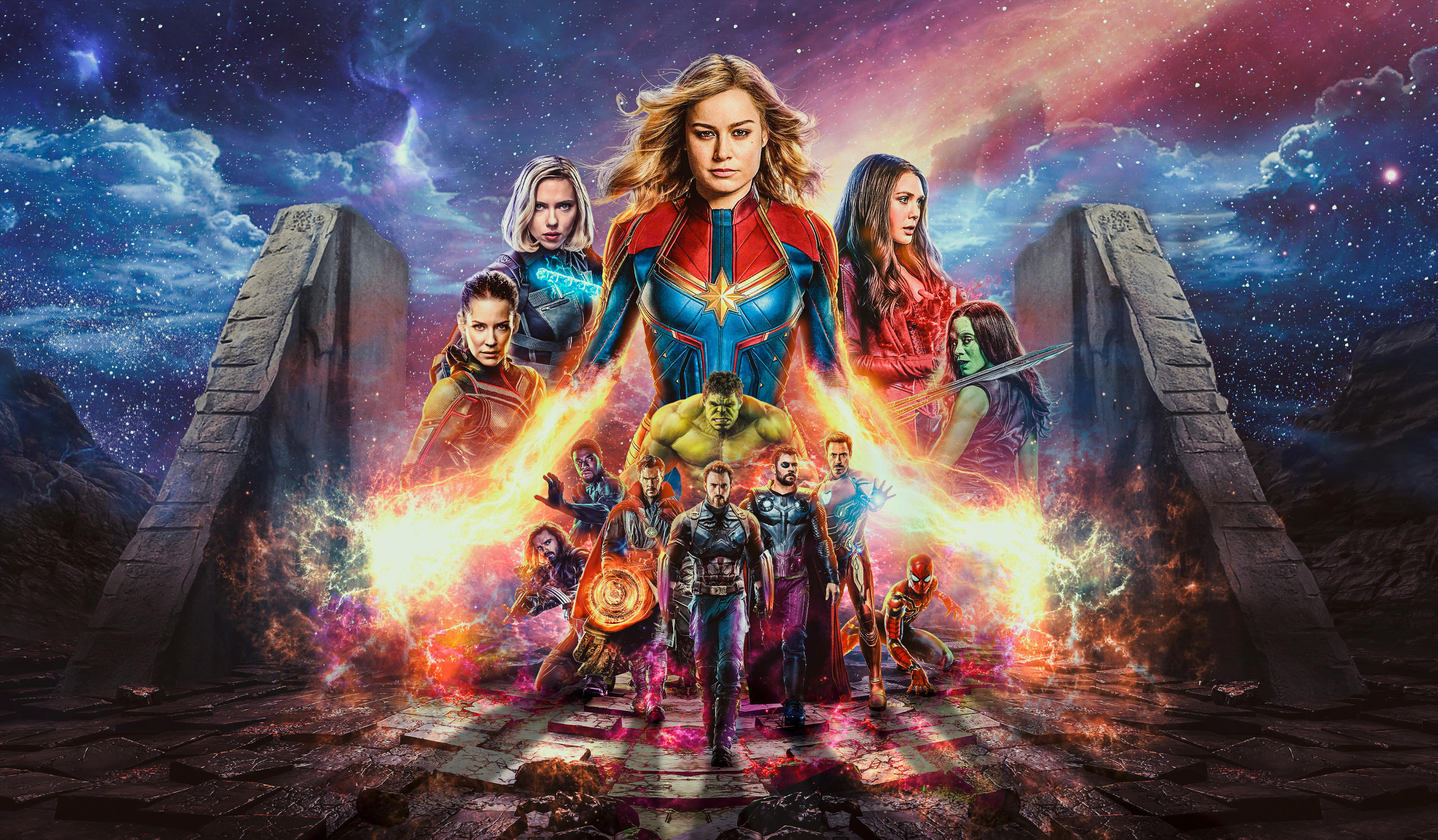
In chess, an “endgame” sees relatively few pieces on the board – but of course, this film is much more heavily populated. Tony Stark (Robert Downey Jr) is floating, desolately, in space, staring extinction in the face. Hawkeye (Jeremy Renner) confronts the loss of his family – a rather eerie, challengingly downbeat opening scene. Steve Rogers, formerly Captain America (Chris Evans) is helping others deal with their awful sense of cosmic grief. Rhodey (Don Cheadle) and Black Widow (Scarlett Johansson) are grimly getting on things. Captain Marvel (Brie Larson) is a vivid new presence in everyone’s lives.
And change is the keynote. Bruce Banner (Mark Ruffalo) has found a way to co-exist as a gentle human intellectual and a green monster. He is now half-man, half-hulk (mulk?) and is now reconciled to a new twilight of celebrity, accepting selfie opportunities with kids.

But Thor (Chris Hemsworth) is a worry. The great catastrophe has caused him to retreat to New Asgard, where he has put on an enormous amount of weight and morosely obsessed with beer and video games. It is a very funny performance from Hemsworth, emphasising that he is first among equals with the Avengers when it comes to comedy. Other people get funny lines as well, and the words “Mungo Jerry” gets one of the biggest laughs of the film.

But part of this movie is about how Thor comes to terms with the memory of his mother, Frigga (Rene Russo), and also in fact how Tony Stark achieves closure on the subject of his dad, Howard (John Slattery). And there are many more characters and subordinate narrative arcs to absorb. The poster is not an infallible guide. It is, as ever, a huge intricately detailed and interlocking mosaic of figures within that strange Avengers universe, which uniquely (and bizarrely) combines both the mythic and the contemporary – and which is here the stage for a Tolkienian quest.
Avengers: Endgame is entirely preposterous and, yes, the central plot device here does not, in itself, deliver the shock of the new. But the sheer enjoyment and fun that it delivers, the pure exotic spectacle, are irresistible, as is its insouciant way of combining the serious and the comic. Without the comedy, the drama would not be palatable. Yet without the earnest, almost childlike belief in the seriousness of what is at stake, the funny stuff would not work either. As an artificial creation, the Avengers have been triumphant, and as entertainment, they have been unconquerable.

How to Improve Your Sleep: 20 Tips for a Better Night's Rest
Sleep is essential for our physical and mental health. When we don't get enough sleep, we're more likely to experience fatigue, difficulty concentrating, mood swings, and even health problems like obesity and heart disease.
The good news is that there are things you can do to improve your sleep quality.

Here are 20 tips to help you get a better night's rest:
- Establish a regular sleep schedule and stick to it as much as possible, even on weekends. This will help to regulate your body's natural sleep-wake cycle.
- Create a relaxing bedtime routine. This could include taking a warm bath, reading a book, or listening to calming music. Avoid watching TV or using electronic devices in the hour before bed, as the blue light emitted from these devices can interfere with sleep.
- Make sure your bedroom is dark, quiet, and cool. Darkness helps to promote the production of melatonin, a hormone that helps to regulate sleep. Noise and light can disrupt sleep, so make sure your bedroom is as dark and quiet as possible. A cool temperature is also ideal for sleep.
- Avoid caffeine and alcohol before bed. Caffeine and alcohol can both interfere with sleep. Caffeine is a stimulant that can make it difficult to fall asleep, while alcohol can disrupt sleep later in the night.
- Get regular exercise. Exercise can help to improve sleep quality, but it's important to avoid exercising too close to bedtime. Aim to finish exercising at least 3 hours before bed.
- Nap during the day if you need to, but keep naps short (30 minutes or less). Long naps can make it harder to fall asleep at night.
- If you can't fall asleep after 20 minutes, get out of bed and do something relaxing until you feel tired. Lying in bed awake can make it harder to fall asleep.
- See a doctor if you have a sleep disorder. If you've tried the tips above and you're still having trouble sleeping, talk to your doctor. There may be an underlying medical condition that's interfering with your sleep.
Here are some additional tips for improving your sleep:
- Make sure your mattress and pillows are comfortable. If you're not comfortable, you're less likely to get a good night's sleep.
- Avoid eating heavy meals or drinking too much fluids before bed. This can make it difficult to fall asleep.
- Go to bed and wake up at the same time each day, even on weekends. This will help to regulate your body's natural sleep-wake cycle.
- Create a relaxing environment in your bedroom. This could include using blackout curtains, earplugs, or a fan to block out noise and light.
- Make sure your bedroom is at a comfortable temperature. Most people find that a cool temperature (between 60 and 67 degrees Fahrenheit) is ideal for sleep.
- Get regular exercise. Exercise can help to improve sleep quality, but it's important to avoid exercising too close to bedtime. Aim to finish exercising at least 3 hours before bed.
- See a doctor if you have a sleep disorder. If you've tried the tips above and you're still having trouble sleeping, talk to your doctor. There may be an underlying medical condition that's interfering with your sleep.
Following these tips can help you improve your sleep quality and get a better night's rest. However, it's important to find what works best for you and to experiment with different techniques. The most important thing is to find a system that you can stick with and that helps you achieve your sleep goals.

Click on the desired partition and delete the partition.
Now click on Freed Disk (which you deleted earlier)
and click on +.
Now we will create 3 partitions by this freed Partition.
The root is the area where Ubuntu will install.
swap is the virtual memory (size should double of RAm size).
home is the user's storage area, all downloads, and application installations will store here.
We still can use windows data in Ubuntu but not vice versa.
Now click + to start making these partitions.
Create the root directory (15 GB is good). (Input is Typed as MB, Make sure you converted to MB).
Now create a swap area (double of your RAM is good, 8000MB is best).
Create home partition Recommended to give all free space.
Step 4 - Follow the on-screen instructions.
After install successful, Ubuntu will ask you to Restart.
Unplug your USB and click Restart.
Enjoy Ubuntu.
Note - If windows are also installed, On startup, you will be asked to choose an operating system.
Fix - If you don't find the windows option on startup, Continue with ubuntu and open Terminal, and type this :
Enjoy Linux's Ubuntu the Open Source Operating System.😃😃

Want to buy a sleek, stylish, business style yet Gaming Oriented Laptop?
Well your search comes to an end now, HP has Launched its Ryzen series, and Not Gonna Lie HP is the most durable, reliable brand in the market.
I personally am using HP laptops for the past 10 years and not a single complaint whether about the software or the hardware.
The laptop which we are going to discuss today is HP 14s-fr0012AU. I will list down all the features, pros, and cons of buying a Ryzen laptop vs an intel laptop, and also last but not least: A Video Review.
Image Courtesy: Amazon
Processor: AMD Ryzen 5 3450U (2.1 GHz base clock, up to 3.5 GHz max boost clock, 4 MB L3 cache, 4 cores)
Operating System: Pre-loaded Windows 10 Home Single Language | Pre-Loaded Microsoft Office 2019
Display: 14 -inch FHD, IPS, micro-edge, brightview | Brightness: 250 nits | Screen Resolution: 1920 x 1080
Memory & Storage: 8 GB DDR4-2400 SDRAM (1 x 8 GB) & Expandable Up to 16 GB | Storage: 512GB PCIe NVMe SSD
Design & battery: Laptop weight: 1.46 kg | Battery life mixed usage = Up to 7 hours and 30 minutes | In the Box: Laptop, Battery, User Manual, and charger
Graphics: AMD Radeon Vega 8 Graphics
Camera & Microphone: HP True Vision 720p HD camera with integrated dual array digital microphones
Ports: 1 SuperSpeed USB Type-C (5Gbps), 2 SuperSpeed USB Type-A (5Gbps), 1 HDMI 1.4b, 1 RJ-45
One more excellent feature is that
You can upgrade it to Windows 11 and that too for FREE FREE FREE.
Now comes the Price :
You can tame this beast at just ₹42,990 INR

That's what we thought Jimmy, But it is real.
No need to mention but will do it any way you can get additional discounts by cashing in the Independence Day Sale.
Now the part for which you have clicked this link
Unboxing and Review

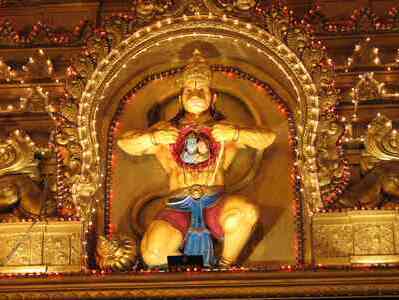
Teachers are the pillars of our future. They are the ones who shape our minds and hearts, and they teach us the skills we need to succeed in life. They are our mentors, our role models, and our friends.
On Teacher's Day, we celebrate the hard work and dedication of our teachers. We thank them for everything they do, and we show them how much we appreciate them.

But Teacher's Day is not just about giving thanks. It is also a day to reflect on the importance of teachers in our society. Teachers are the ones who build the foundation for our future. They are the ones who create the next generation of leaders, innovators, and changemakers.
Without teachers, our world would be a very different place. We would not have the doctors, lawyers, engineers, and scientists who make our lives better. We would not have the artists, musicians, and writers who enrich our culture. We would not have the leaders who guide us through difficult times.
Teachers are the pillars of our future. They are the ones who make the world a better place.
Here are some of the ways that teachers shape our future:
They teach us the skills we need to succeed in school and in life.
They help us to develop our critical thinking skills and our problem-solving abilities.
They teach us about the world around us and how to make a difference in it.
They inspire us to dream big and reach for our goals.
They build our confidence and help us to believe in ourselves.
They create a safe and supportive learning environment where we can thrive.
Teachers are essential to our society. They deserve our respect, our gratitude, and our support.

How can we honor our teachers?
There are many ways to honor our teachers on Teacher's Day and throughout the year. Here are a few ideas:
Write a thank-you note to your teacher.
Give your teacher a small gift, such as a plant, a book, or a gift certificate to their favorite coffee shop.
Make a card for your teacher. Draw a picture, write a poem, or simply say "thank you" in your own words.
Plan a special activity for your class. This could be anything from a potluck lunch to a game day.
Volunteer your time to help out in your teacher's classroom.
Donate to a teacher's scholarship fund.
Advocate for better working conditions for teachers.
No matter how you choose to honor your teachers, make sure to let them know how much you appreciate them. They deserve it!
Thank you, teachers, for everything you do! You are the pillars of our future.

As this will have codes and architecture planning, we will break this post into 4 parts.
Today, we will be building an android application using Kotlin, Room DB, and Dagger Hilt on MVVM clean architecture.
To build this you should be familiar with SQL DB, and dependency injection.
Here is a glimpse of the tech we are going to use -
MVVM - Model-VIew-View-Model - In this pattern, the View just observes the view model object and reacts to changes in the object. ViewModel is responsible for the logic and can hold the UI state data.
Room DB - Room DB is a superset of SQLite and wraps so many things under the hood and gives abstraction as well as compile time safety of SQL queries. Using this we can do many things with few lines of code.
Dagger Hilt - Dagger Hilt makes dependency injection in Android so much easy. As you may already know how handling objects in android can be a tough task, HILT comes here for the rescue.
Now let’s start building the app.
Follow the given step and be careful if you miss the step, the application may work differently -
- Create an empty android app.
- Open app/build.gradle and add the following (main code here)
- at the top of the file replace plugin code with GitHub code.
- in the dependency section place the content from my GitHub file
3. Open build.gradle and add the code from here
Once done, click on sync Gradle. Wait for the build to be finished. If you face any errors, check if you have done all steps carefully.
Part 2 coming soon.

Unfortunately, the COVID-19 pandemic is still affecting the world in 2023. While some countries have managed to control the spread of the virus, others are still struggling to cope with the impact of the pandemic. In this blog, we will discuss the current situation of COVID-19 in 2023 and what we can do to protect ourselves.

1. The current situation of COVID-19 in 2023
As of April 2023, the total number of COVID-19 cases worldwide has surpassed 500 million, with over 10 million deaths reported. Despite the availability of vaccines, the virus continues to spread in many parts of the world. The emergence of new variants of the virus is a major concern, as some of them may be more transmissible and resistant to the current vaccines.
The impact of the pandemic has been devastating, with many people losing their jobs, businesses closing down, and economies suffering. The pandemic has also had a significant impact on mental health, with many people experiencing anxiety, depression, and other related issues.
2. What we can do to protect ourselves
While the situation may seem grim, there are still things we can do to protect ourselves and others from COVID-19. Here are some essential strategies that everyone should follow:
3. Get vaccinated
Vaccination is one of the most effective ways to protect ourselves from COVID-19. If you are eligible, get vaccinated as soon as possible. Vaccines have been shown to be safe and effective in preventing severe illness, hospitalization, and death.
4. Wear a mask
Wearing a mask is still important, even if you are fully vaccinated. Masks provide an additional layer of protection and reduce the spread of the virus.
5. Practice social distancing
Social distancing is still essential to reduce the spread of the virus. Avoid crowded places, maintain a distance of at least six feet from others, and avoid close contact with people who are sick.
6. Wash your hands
Washing your hands regularly with soap and water for at least 20 seconds is essential to prevent the spread of the virus. Use hand sanitizer if soap and water are not available.
7. Follow local guidelines
Follow the guidelines provided by your local health authorities. This may include restrictions on travel, gatherings, and other activities.
8. Avoid touching your face
Touching your face, especially your eyes, nose, and mouth, can increase the risk of getting infected with COVID-19. Avoid touching your face, and if you have to, make sure to wash your hands thoroughly before and after.
9. Stay home if you feel sick
If you have symptoms of COVID-19, such as fever, cough, or shortness of breath, it is essential to stay home and avoid contact with others. Get tested for COVID-19 as soon as possible and follow the guidelines provided by your healthcare provider.
10. Clean and disinfect frequently touched surfaces
Frequently touched surfaces, such as doorknobs, countertops, and phones, can harbor the virus. It is essential to clean and disinfect these surfaces regularly using disinfectants recommended by the Centers for Disease Control and Prevention (CDC).

Conclusion
The COVID-19 pandemic is still a major global health crisis in 2023. However, we can still take steps to protect ourselves and others from the virus. Get vaccinated, wear a mask, practice social distancing, wash your hands, and follow local guidelines. Let us all do our part to fight this pandemic and stay safe.

Cloud computing has become a game-changer in the tech industry, allowing businesses and individuals to leverage the power of the cloud to build, deploy, and manage applications and services at scale. Among the leading cloud providers, Amazon Web Services (AWS) stands out as the most comprehensive and flexible platform, offering a vast array of services and tools to meet diverse needs and use cases.
In this blog, we'll explore 5 practical applications that will help you get hands-on with AWS and boost your cloud computing skills. Whether you're a developer, a system administrator, or a business owner, these applications will give you a taste of what AWS can do and how you can leverage it to build better, faster, and more secure applications.
1. Host a Static Website on Amazon S3
If you have a static website, you can use Amazon S3 to host it. To do this, you can follow these steps:
- Create an S3 bucket with a unique name.
- Enable static website hosting for your bucket.
- Upload your website files to your bucket.
- Configure your bucket policy to allow public access to your files.
- Optionally, use Amazon CloudFront to improve the performance and security of your website.

2. Build a Serverless Web Application with AWS Lambda and Amazon API Gateway
If you want to build a serverless web application, you can use AWS Lambda and Amazon API Gateway. To do this, you can follow these steps:
- Create a Lambda function that handles your application logic.
- Create an API Gateway REST API that exposes your Lambda function as an HTTP endpoint.
- Test your API using the API Gateway console or a REST client.
- Optionally, add authentication and authorization to your API using Amazon Cognito or AWS Identity and Access Management (IAM).
- Deploy your API to a stage and monitor its usage using Amazon CloudWatch.
Read Serverless App Development with AWS Lambda and API Gateway

3. Process Data in Real-Time with Amazon Kinesis
If you want to process data in real time, you can use Amazon Kinesis. To do this, you can follow these steps:
- Create a Kinesis data stream that receives your data.
- Create a Kinesis data analytics application that processes your data using SQL queries.
- Optionally, create a Kinesis data firehose delivery stream that stores your processed data in Amazon S3 or other destinations.
- Test your application using sample data or a data generator.
- Scale your application and monitor its performance using Amazon CloudWatch.

4. Create a Multi-Region Deployment with Amazon Route 53 and Amazon S3
If you want to create a multi-region deployment, you can use Amazon Route 53 and Amazon S3. To do this, you can follow these steps:
- Create an S3 bucket in each region that hosts your content or application.
- Enable static website hosting for each bucket.
- Create a Route 53 DNS record set that maps your domain name to your S3 buckets using latency-based routing.
- Test your deployment using a DNS lookup tool or a web browser.
- Optionally, use Amazon CloudFront to improve the performance and security of your deployment.

5. Build a Data Warehouse with Amazon Redshift
If you want to build a data warehouse, you can use Amazon Redshift. To do this, you can follow these steps:
- Create a Redshift cluster that stores your data.
- Load your data into your cluster using COPY or other methods.
- Create tables and views that organize and transform your data using SQL queries.
- Connect to your cluster using a SQL client or a BI tool.
- Monitor and optimize your cluster using Amazon Redshift console or Amazon CloudWatch.

These are just a few examples of practical AWS applications using different AWS services. With AWS, the possibilities are endless and you can build and deploy a wide range of applications and services to meet your specific needs.

Introduction: Social media marketing has become an integral part of digital marketing strategies for businesses worldwide. The ever-increasing reach of social media platforms and the ability to target specific audiences have made them an attractive marketing tool. However, social media marketing is not without its pitfalls. In this blog post, we will discuss five avoidable pitfalls of the social media marketing that businesses must be aware of to maximize their returns on investment (ROI).

Table of Contents:
- Focusing on the wrong metrics
- Not understanding your audience
- Ignoring negative feedback
- Lack of consistency in posting
- Not having a clear strategy
Focusing on the wrong metrics:
One of the common pitfalls of social media marketing is focusing on the wrong metrics. Businesses often make the mistake of focusing on vanity metrics such as the number of followers or likes, rather than meaningful metrics such as engagement rate and conversion rate. Having a large number of followers or likes does not necessarily translate into higher sales or ROI. Therefore, it is essential to focus on metrics that have a direct impact on the business's bottom line.
Not understanding your audience:
Another pitfall of social media marketing is not understanding your audience. Businesses must understand their target audience's preferences, interests, and behavior to create content that resonates with them. Failing to understand your audience can lead to ineffective marketing campaigns, resulting in lower engagement and conversion rates.
Ignoring negative feedback:
Ignoring negative feedback on social media can be detrimental to a business's reputation. Negative feedback provides an opportunity for businesses to address their customers' concerns and improve their products or services. Ignoring negative feedback can result in a damaged reputation and loss of customers.
Lack of consistency in posting:
Consistency is key when it comes to social media marketing. Posting regularly on social media platforms helps keep your brand in front of your audience, improves engagement, and helps build a loyal following. Failing to post regularly can result in a decrease in engagement and followers.
Not having a clear strategy:
Not having a clear strategy is a significant pitfall of social media marketing. A clear strategy helps businesses define their objectives, target audience, and metrics for success. Without a clear strategy, businesses risk wasting time and money on ineffective social media marketing campaigns.

Conclusion:
Social media marketing is a powerful tool for businesses to reach their target audience and improve their bottom line. However, it is essential to avoid the common pitfalls of social media marketing to maximize the returns on investment. By focusing on meaningful metrics, understanding your audience, addressing negative feedback, posting consistently, and having a clear strategy, businesses can create effective social media marketing campaigns that deliver results.

Holi is one of the most vibrant and joyful festivals in India. It is celebrated every year on the full moon day of the Hindu month of Phalguna, which usually falls in late February or early March. In 2023, Holi will be celebrated on March 8, with Chhoti Holi or Holika Dahan on March 7.
Holi is also known as the festival of colors, as people play with colored powders and water, splashing and spraying each other with fun and laughter. Holi is a celebration of life, love, and happiness. Time to forgive and forget, mend broken relationships, and express gratitude for all the blessings.
But do you know why Holi is celebrated? What are the stories and legends behind this colorful festival? What are the meanings and messages that Holi conveys? In this blog, we will explore the history and significance of Holi in India.
There are many stories and legends associated with Holi, but the most popular one is about Holika and Prahlad. Holika was a demoness who was the sister of King Hiranyakashipu, a tyrant who wanted everyone to worship him as God. Prahlad was his son who was a devotee of Lord Vishnu, the supreme deity in Hinduism. Hiranyakashipu hated his son’s devotion and tried to kill him many times, but failed. He then asked Holika to help him get rid of Prahlad. Holika had a boon that she could not be burned by fire, so she agreed to sit on a pyre with Prahlad on her lap. However, her boon was nullified by her evil intention, and she was burned to ashes while Prahlad emerged unharmed by chanting Lord Vishnu’s name. This story symbolizes the victory of good over evil and the power of faith.
Another story related to Holi is about Lord Krishna and Radha. Lord Krishna is an incarnation of Lord Vishnu who was born with a dark complexion due to a curse by a demon. He grew up in Vrindavan, where he fell in love with Radha, a fair-skinned girl. He was insecure about his appearance and wondered if Radha would love him back. His mother Yashoda advised him to apply some color to Radha’s face and make her look like him. He followed her advice and playfully smeared some color on Radha’s face, making her his own forever. Radha also reciprocated his love and accepted him as he was. This story symbolizes the divine love between Krishna and Radha and the celebration of diversity.
Holi is also marked as a harvest festival, commemorating spring’s arrival and the end of winter. It is a time when nature is filled with colors and beauty, inspiring people to rejoice in its glory. Holi also signifies new beginnings, as people shed their old clothes and wear new ones after playing with colors. It is an occasion when people let go of their grudges and negative energies, forgive their enemies, reconcile their differences, and start afresh with love and harmony.














